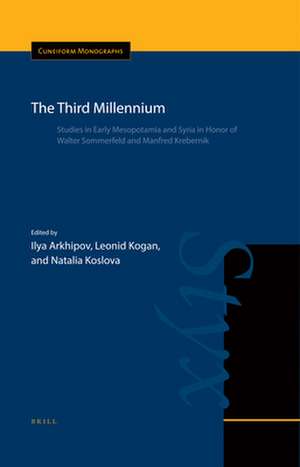The Third Millennium: Studies in Early Mesopotamia and Syria in Honor of Walter Sommerfeld and Manfred Krebernik: Cuneiform Monographs, cartea 50
Editat de Ilya Arkhipov, Leonid Kogan, Natalia Koslovaen Limba Engleză Hardback – 5 feb 2020
Din seria Cuneiform Monographs
- 18%
 Preț: 939.81 lei
Preț: 939.81 lei - 15%
 Preț: 540.47 lei
Preț: 540.47 lei - 18%
 Preț: 1652.48 lei
Preț: 1652.48 lei - 18%
 Preț: 1287.49 lei
Preț: 1287.49 lei - 18%
 Preț: 1075.02 lei
Preț: 1075.02 lei - 18%
 Preț: 929.10 lei
Preț: 929.10 lei - 18%
 Preț: 950.26 lei
Preț: 950.26 lei - 18%
 Preț: 802.67 lei
Preț: 802.67 lei - 18%
 Preț: 1156.00 lei
Preț: 1156.00 lei - 18%
 Preț: 948.27 lei
Preț: 948.27 lei - 18%
 Preț: 921.74 lei
Preț: 921.74 lei - 18%
 Preț: 1055.61 lei
Preț: 1055.61 lei - 18%
 Preț: 1151.35 lei
Preț: 1151.35 lei - 18%
 Preț: 1198.62 lei
Preț: 1198.62 lei - 18%
 Preț: 1142.66 lei
Preț: 1142.66 lei - 18%
 Preț: 1198.85 lei
Preț: 1198.85 lei - 18%
 Preț: 1046.06 lei
Preț: 1046.06 lei - 18%
 Preț: 1263.39 lei
Preț: 1263.39 lei - 18%
 Preț: 1010.22 lei
Preț: 1010.22 lei - 18%
 Preț: 871.26 lei
Preț: 871.26 lei - 18%
 Preț: 721.44 lei
Preț: 721.44 lei - 18%
 Preț: 1053.64 lei
Preț: 1053.64 lei - 18%
 Preț: 579.22 lei
Preț: 579.22 lei - 18%
 Preț: 843.52 lei
Preț: 843.52 lei - 18%
 Preț: 1235.20 lei
Preț: 1235.20 lei - 18%
 Preț: 814.95 lei
Preț: 814.95 lei -
 Preț: 363.01 lei
Preț: 363.01 lei - 18%
 Preț: 1821.27 lei
Preț: 1821.27 lei - 18%
 Preț: 1006.78 lei
Preț: 1006.78 lei - 18%
 Preț: 883.07 lei
Preț: 883.07 lei - 18%
 Preț: 784.54 lei
Preț: 784.54 lei - 18%
 Preț: 1485.73 lei
Preț: 1485.73 lei - 18%
 Preț: 1175.72 lei
Preț: 1175.72 lei - 18%
 Preț: 631.60 lei
Preț: 631.60 lei - 18%
 Preț: 1074.03 lei
Preț: 1074.03 lei - 18%
 Preț: 862.90 lei
Preț: 862.90 lei - 18%
 Preț: 1205.68 lei
Preț: 1205.68 lei - 18%
 Preț: 743.69 lei
Preț: 743.69 lei
Preț: 1070.18 lei
Preț vechi: 1305.10 lei
-18% Nou
Puncte Express: 1605
Preț estimativ în valută:
204.80€ • 212.60$ • 170.77£
204.80€ • 212.60$ • 170.77£
Carte indisponibilă temporar
Doresc să fiu notificat când acest titlu va fi disponibil:
Se trimite...
Preluare comenzi: 021 569.72.76
Specificații
ISBN-13: 9789004418073
ISBN-10: 9004418075
Dimensiuni: 155 x 235 mm
Greutate: 0 kg
Editura: Brill
Colecția Brill
Seria Cuneiform Monographs
ISBN-10: 9004418075
Dimensiuni: 155 x 235 mm
Greutate: 0 kg
Editura: Brill
Colecția Brill
Seria Cuneiform Monographs
Notă biografică
Ilya Arkhipov, National Research University Higher School of Economics, has published a volume of texts from the Mari archives, and a number of articles on the history of Old Babylonian Upper Mesopotamia and Akkadian language.
Leonid Kogan, National Research University Higher School of Economics, has published a number of monographs and articles on comparative Semitics and historical grammar of Akkadian.
Natalia Koslova, State Hermitage Museum, has published two volumes of Ur III texts and a number of articles on Ur III economy and society.
Leonid Kogan, National Research University Higher School of Economics, has published a number of monographs and articles on comparative Semitics and historical grammar of Akkadian.
Natalia Koslova, State Hermitage Museum, has published two volumes of Ur III texts and a number of articles on Ur III economy and society.
Recenzii
"This splendid combined Festschrift for two of the dies superiores of third-millennium studies offers thirty-seven essays by forty-two authors, mostly spanning the Uruk IV to the Old Babylonian periods. (...) Along the way the authors discuss the nature and consequence of human praise of divinities and the meaning of Inanna’s attribute kù “radiant” or “brilliant.” These last properties well describe the cumulative effect of these studies in honor of two master scholars who have played a leading role in the exploration of the recalcitrant, fascinating, and evergrowing treasury of Mesopotamian written sources of the third millennium BCE."
- Benjamin R. Foster, Yale University, in Journal of the American Oriental Society 142.2 (2022).
- Benjamin R. Foster, Yale University, in Journal of the American Oriental Society 142.2 (2022).
